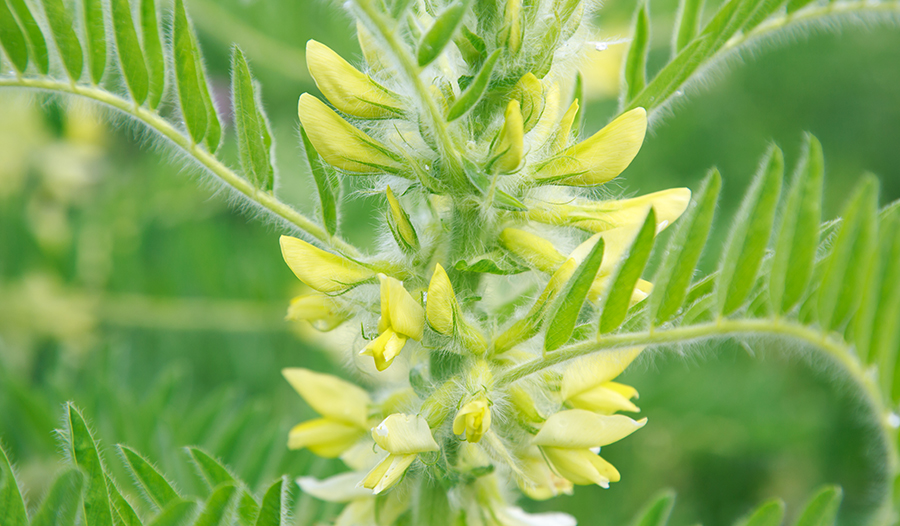6 Incredible Health Benefits of Astragalus (Huang Qi)

Astragalus, or Huang Qi, is known as the “yellow leader” and has been used in Asia for thousands of years. This renowned herb, native to China, Mongolia, and North Korea, is praised for its ability to restore health on all levels—physically, mentally, emotionally, and spiritually.
The name “yellow leader” reflects that its root, the part of the Astragalus plant most commonly used in herbalism, is yellow in color. It also reflects Astragalus’s categorization in the highest class of herbal ingredients in Traditional Oriental Medicine (TOM). Astragalus is listed in the superior class of herbs in classic medical texts and is considered one of the 50 fundamental herbs in Traditional Chinese Medicine.
What Is Astragalus?
Astragalus (Astragalus membranaceus) is a member of the Fabaceae or pea family, which is the third-largest plant family in the world and contains many valuable herbs. The thousands of non-medicinal Astragaluses are often called “milkvetches.” They include a wide variety of edible, poisonous, and ornamental plants. In addition to being large and varied, this plant family grows widely throughout the globe.
Although Astragalus is thought to have been used medicinally in China for at least 2,000 years, it first appeared in the revered Traditional Chinese Medicine (TCM) text known as The Shen Nong Ben Cao Jing (The Divine Farmer’s Materia Medica Classic). This text is the foundation of TCM. Within it, medicinal plants are arranged by type—herb, fruit, root, etc.—and graded by potency. Astragalus is consistently categorized in the highest class of herbal ingredients.
Astragalus was finally introduced to North America in 1952. However, according to herbalist Stephen Buhner, it wasn't widely used until the 1960s, when Eastern herbs became popular among western herbalists.
What Is Astralagus (Huang Qi) Good For?
One of the most potent immune tonics in Eastern and Western herbal pharmacopeias, you can take astragalus as a tea, tincture, tablet, capsule, or soup. It is also a powerful anti-aging ingredient in skincare products.
Astragalus may offer many benefits, including support for allergies, constipation, the common cold, and upper respiratory infections.
1. Immune Support
According to Traditional Oriental Medicine, astragalus strengthens wei qi (vital energy), or the protective layer of energy just below the skin. In TOM, strengthening wei qi helps protect us from the common cold. To prevent the common cold, astragalus is often paired with other nourishing and immune-boosting herbs, such as elderberry, echinacea, reishi, maitake, and shitake mushrooms.
Studies suggest astragalus has antiviral properties and may help stimulate the immune system. It also has powerful antibacterial and anti-inflammatory properties. It is recommended as a topical treatment skin for wound care.
Astragalus is considered a potent adaptogen that helps protect the body from stress and disease and helps create balance within the body. It is often used to increase vitality, stamina, and mental focus. When you are dealing with stress and anxiety, astragalus may be used to help calm and ground you, bringing you back to a state of harmony.
2. Longevity, Energy, & Vitality
Astragalus may help boost energy and increase stamina, both physically and mentally. In TOM, astragalus is one of the most powerful herbs for increasing qi, or life-force energy. It is often used to increase energy and stamina when energy is depleted.
Studies on human cells suggest astragalus may help promote healthy cell replication and DNA repair. Telomerase is a unique protein that repairs damaged DNA sequences in our cells. Astragalus contains compounds that have measurable telomerase-stimulating and enhancing effects, which have been linked to increased longevity, anti-aging, and DNA repair.
3. Heart Health
Astragalus contains flavonoids, which are potent antioxidants. Studies suggest flavonoids support heart health by helping reduce blood pressure, promoting healthy cholesterol levels, and improving heart function.
4. Allergies
In one well-known study, astragalus helped reduce symptoms in people with allergic rhinitis or hay fever.
5. Healthy Respiratory & Circulatory Systems
According to TOM, astragalus protects lung qi, or lung energy. Modern research suggests astragalus supports healthy lung function and may help improve circulation and blood flow. It also nourishes and tonifies the blood due to its high level of bioavailable iron.
6. Healthy Skin
Astragalus increases qi and circulation, which directly helps improve skin cells and, therefore, the overall quality and appearance of skin. It helps restore the skin’s natural balance by removing toxins, stimulating collagen production, reducing inflammation, improving blood circulation, and regenerating skin cells.
In skincare products, astragalus helps promote healthier, more youthful skin by encouraging healthy cell replication and reducing inflammation. It is one of my favorite herbs to use when formulating skin and body care products aimed at reducing signs of aging and improving the overall vitality of skin.
Quality & Potency
As with all herbal products, organic, wild-harvested, and wildcrafted astragalus supplements and products are best. Always look for companies and formulators who value quality and have knowledge of proper formulation.
Safety & Precautions
At recommended doses, astragalus has no serious side effects and can generally be used safely.
Currently, there is no evidence on whether astragalus is safe for breastfeeding women. Because astragalus may stimulate the immune system, those with autoimmune disease should consult their physician before taking Astragalus.
Always speak with your doctor before taking any medication, including herbs, to be sure they are safe for you and won’t interact with other medications you are taking.
References:
- Botanical Medicine for Women's Health by Dr. Aviva Romm
- Encyclopedia of Herbal Medicine by Andrew Chevallier
- Planetary Herbology by Michael Tierra
- Harley CB, Liu W, Blasco M, et al. A Natural Product Telomerase Activator As Part of a Health Maintenance Program. Rejuvenation Research. 2011;14(1):45-56. doi:10.1089/rej.2010.1085.
- Matkovic Z, Zivkovic V, Korica M, et al. Efficacy and safety of Astragalus membranaceus in the treatment of patients with seasonal allergic rhinitis. Phytother Res. 2010;24:175-81.
- Yang QY, Lu S, Sun HR. Clinical effect of Astragalus granule of different dosages on quality of life in patients with chronic heart failure. Chin J Integr Med. 2011;17(2):146-9
DISCLAIMER:This Wellness Hub does not intend to provide diagnosis...
















































































 Table of Contents
Table of Contents
















